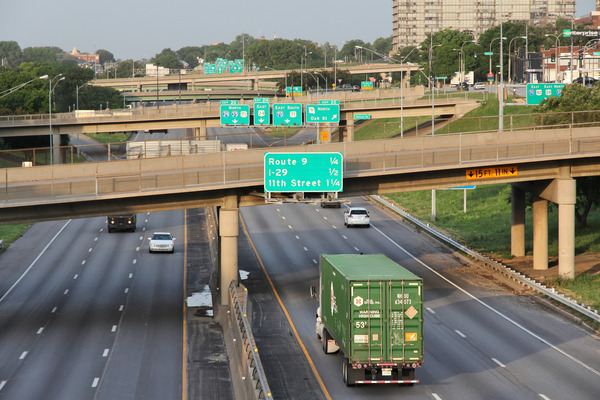
As one of the largest trucking hubs in the United States, Kansas City plays a pivotal role in the movement of goods across highways, railroads, and intermodal transportation systems. While this contributes to the city’s economy, it also comes with increased risks on the road. The bustling trucking activity creates a higher potential for accidents, often leading to devastating consequences for drivers and pedestrians.
Our Kansas City truck accident lawyers understand the unique risks of living and driving in a major trucking hub like Kansas City. In this blog, we explore what makes Kansas City a critical center for the trucking industry, the risks this poses for accidents, and how Missouri law protects accident victims.
Kansas City’s role as a major trucking hub
Kansas City’s central location makes it a strategic hub for the trucking and logistics industries. With its proximity to major highways like I-70, I-35, and I-29 and its extensive rail network, Kansas City connects the East and West coasts and the Northern and Southern regions of the U.S. This accessibility makes it a vital distribution point for goods traveling cross-country.
Several factors contribute to Kansas City’s prominence as a trucking hub:
- Central location – Situated near the geographic center of the continental U.S., Kansas City is ideally positioned for nationwide distribution.
- Intermodal transportation – The city is a major center for intermodal transport, which involves moving goods using multiple forms of transportation, such as trucks, trains, and ships. Kansas City’s extensive rail and trucking network makes it a key player in intermodal freight transportation.
- Warehouses and distribution centers – Kansas City is home to numerous warehouses and distribution centers, which serve as key links in the supply chain for companies like Amazon, UPS, and FedEx.
While these factors contribute to the efficiency of the trucking industry, they also increase the volume of large trucks on Kansas City’s roads, making accidents more likely.
Increased accident risks in a trucking hub
The high volume of commercial truck traffic in and around Kansas City creates unique risks for drivers. Here’s how Kansas City’s role as a major trucking hub contributes to an elevated risk of accidents.
1. Increased traffic congestion
With so many trucks, traffic congestion is inevitable, particularly on major highways and near distribution centers. Traffic congestion increases the likelihood of collisions as drivers try to navigate crowded roads and deal with frequent stop-and-go conditions.
2. Higher incidence of fatigued driving
Long-haul truck drivers often face demanding schedules, and fatigued driving is a common issue in the trucking industry. Truck drivers may push their limits to meet tight deadlines, leading to impaired reaction times and poor decision-making on the road. According to the Federal Motor Carrier Safety Administration (FMCSA), driver fatigue is a leading cause of trucking accidents.
3. Limited visibility and blind spots
Trucks have large blind spots that make it difficult for drivers to see smaller vehicles, particularly when changing lanes or merging. These blind spots, also known as “no-zones,” can cause dangerous collisions, especially in high-traffic areas like Kansas City’s highways.
4. Longer stopping distances
The size and weight of commercial trucks mean they require more time and distance to stop compared to smaller vehicles. In situations where traffic stops suddenly, truck drivers may be unable to brake in time, leading to rear-end collisions or pile-ups.
5. Cargo-related hazards
Improperly secured or overloaded cargo can create additional hazards on the road. Shifting or spilling cargo can cause trucks to lose control or create obstacles for other drivers, increasing the risk of accidents.
Case studies: Trucking accidents in Kansas City
Interstate 70 pile-up (2019)
In 2019, a fatal pile-up involving several semi-trucks occurred on Interstate 70 near Kansas City. The accident resulted in multiple fatalities and highlighted the dangers of heavy truck traffic on congested highways. Investigations revealed that one truck driver was fatigued, contributing to the chain-reaction collision.
Overloaded cargo on I-35
A truck carrying improperly secured cargo caused a serious accident on I-35 when part of the load fell off the truck, creating a road hazard that led to a multi-vehicle crash. The trucking company was found liable for failing to ensure that the cargo was properly secured, leading to significant settlements for the victims.
How Langdon & Emison can help after a trucking accident
If you or a loved one has been involved in a trucking accident in Kansas City, navigating the legal landscape can be overwhelming. At Langdon & Emison, we specialize in representing victims of trucking accidents and have the experience necessary to handle the complexities of cases involving truck drivers, trucking companies, and large corporations.
Our team will work to:
- Investigate the accident and gather critical evidence, such as truck logs, maintenance records, and driver history.
- Determine whether any state or federal regulations were violated.
- Consult with accident reconstruction experts to build a strong case on your behalf.
We are dedicated to ensuring that victims of trucking accidents receive the compensation they deserve for medical expenses, lost wages, pain and suffering, and other damages.
Contact Langdon & Emison today
Kansas City’s role as a major trucking hub creates unique risks for drivers and pedestrians alike. If you’ve been injured in a trucking accident, it’s essential to seek legal guidance from experienced attorneys who understand the complexities of these cases. Contact Langdon & Emison today for a free consultation to discuss your case and explore your legal options.
Visit our website or call us at (866) 931-2115 to learn more about how we can help you with your trucking accident case.


